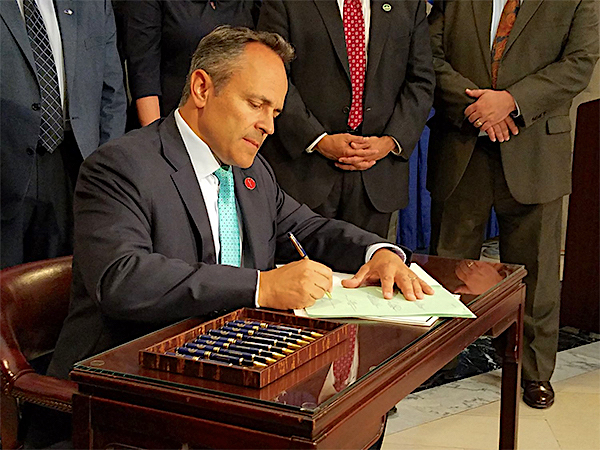Governor signs pension bill into law following final approval in senate, bringing end to special session
The Senate gave final approval for a pension bill providing relief to the regional public universities and other quasi-governmental agencies on Wednesday, followed quickly by Gov. Matt Bevin signing the measure into law, and bringing an end to the special session after five days.
Following two hours of floor debate, the measure passed the Senate 27-11, with two Republicans, Tom Buford and C. B. Embry, joining the Democratic minority in voting against the bill.
During the debate, Sen. Christian McDaniel, R-Taylor Mill, who presented the measure, said: “These quasi-governmental agencies simply cannot afford participation in the Kentucky Employees Retirement System.”
Pension costs for those agencies during the fiscal year that ended June 30, paid about 49 percent of their payroll costs into the system due to the unfunded liability, but without legislative relief, those costs would double.

“This bill is far superior to what has been exercised by several of our quasi-governmental employers, which is simply to bring the employees in, terminate their employment and stop making payments to the Kentucky Retirement Systems.”
Senate Minority Leader Morgan McGarvey, D-Louisville, expressed his concerns about the bill.
“Maybe it’s not obvious today, but I think this path is the beginning of the end for state pensions,” he said. “We’re going to cut their pensions off today. We’re going to tell them, ‘Take your salary and find another job,’ or come up with a measly 401-K for the years you have left in your working life.”
Senate Majority Leader Damon Thayer, R-Georgetown, responded to McGarvey’s comments. “Saying this will collapse the pension system is so far beyond the pale, it’s not even believable. It’s a red herring, a ruse. Something to get the attention of groups not even affected by this bill.”
Sen. Robin Webb, D-Grayson spoke against the bill. “This is a sad day for the quasi-agencies because they are in a bad situation and we put them there,” referring to years of underfunding the pension system by previous legislatures and governors.
“What has happened to the independence of this body?” she asked. “Why are we afraid to hear from the stakeholders? To do open and honest investigations of actuarial analysis?”
Sen. Stephen Meredith, R-Leitchfield, warned his colleagues, “If we don’t do this today, tomorrow hundreds of employees will lose their jobs, and Kentuckians will lose their services.”
Before the final vote was taken, the Senate defeated three amendments offered by Webb, McGarvey and Sen. Reginald Thomas, D-Lexington, all by identical 28-9 votes.
A ceremony for the bill was held Wednesday afternoon in the Capitol Rotunda, during which Gov. Bevin signed the bill. It had an emergency clause meaning it took effect upon his signature.
“This bill doesn’t by any stretch resolve the pension crisis in Kentucky,” he said during remarks at the event. “But it is a remarkably responsible and appropriate next step in moving toward financial solvency.”
During his remarks the governor noted the public pension system has an unfunded liability of over $60 billion.
His bottom line is that this means those workers will have what they were promised.
“People will have a pension check that they can count on it. That the dignity of their last years will not be muddied by financial problem in their homes as the result of not getting what the state owes them.”
During debate in the House on Monday, Speaker David Osborne, R-Prospect, ruled three amendments offered by Democrats were out of order, since they failed to address the dozen provisions wanted in any legislation and was contained in the measure.
Attorney General Andy Beshear, a Democrat who is opposing Bevin’s re-election bid, warned, “that directly puts any legislation passed in this special session in legal jeopardy. The governor can dictate the subject of a special session, but he cannot steamroll the independence of the legislature.”
Beshear said: “Kentucky’s taxpayers are spending $66,000 a day on this special session and any legislation that is passed is now in jeopardy. The future of rape crisis centers and rural health clinics are at stake. We need to get this right.”
Bevin responded to Beshear’s statement, saying, “There’s no basis for any action to be taken.”
The state Cabinet for Health and Family Services joined in praising the action, agencies within the Cabinet include local health departments and community mental health centers.
“CHFS stands ready to support these agencies as they determine the best path forward, and our administration is committed to ensuring continuity of critical services provided by our local health departments and mental health centers,” said CHFS Secretary Adam Meier.
In the last month, Department of Public Health Commissioner Dr. Jeffrey Howard met with 12 of the 18 local health departments that are at greatest risk for financial insolvency. These agencies are already implementing changes, but the passage of the measure will allow them additional time to choose a pension payment option that is best for their individual financial situation.
Agencies have until next April to decide of they will opt out of the pension plan. Those who leave will still have to pay off their unfunded liability, either in a lump sum or in annual installments over 30 years. They will also have to offer an alternative pension plan, such as a 401-K to their employees, if they decide not to keep veteran employees within the current state pension system.
The end of the special session means lawmakers will not return to Frankfort until Jan. 7, unless another special session is called by the governor.
By Tom Latek
Kentucky Today













![Foothills-Bundle] Foothills-Bundle](https://thelevisalazer.com/wp-content/uploads/2020/05/Foothills-Bundle-422x74.jpg)






you the man Matt